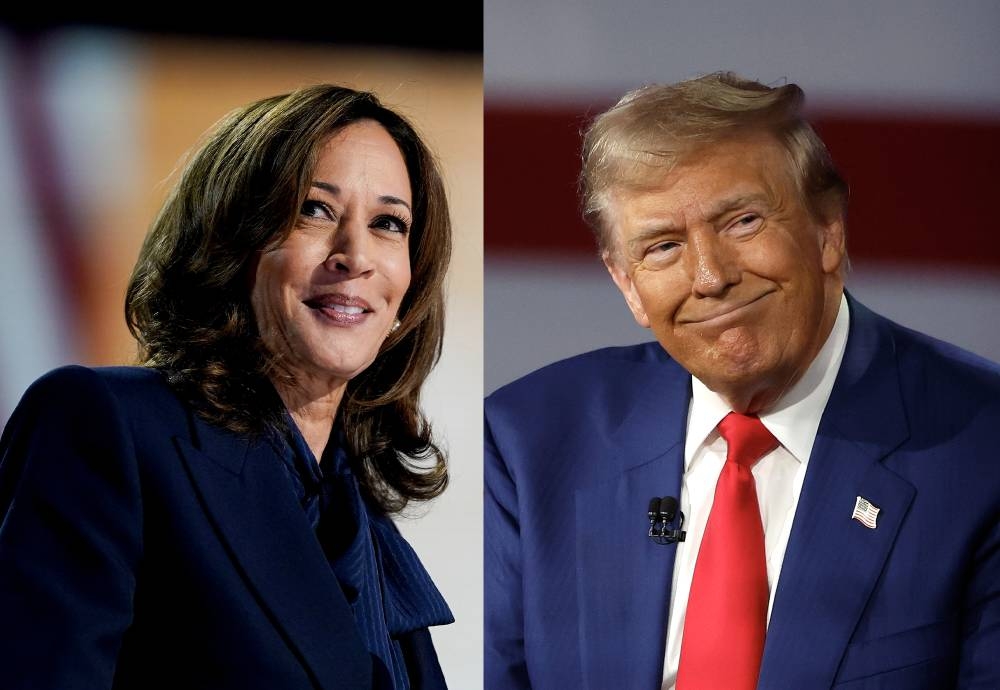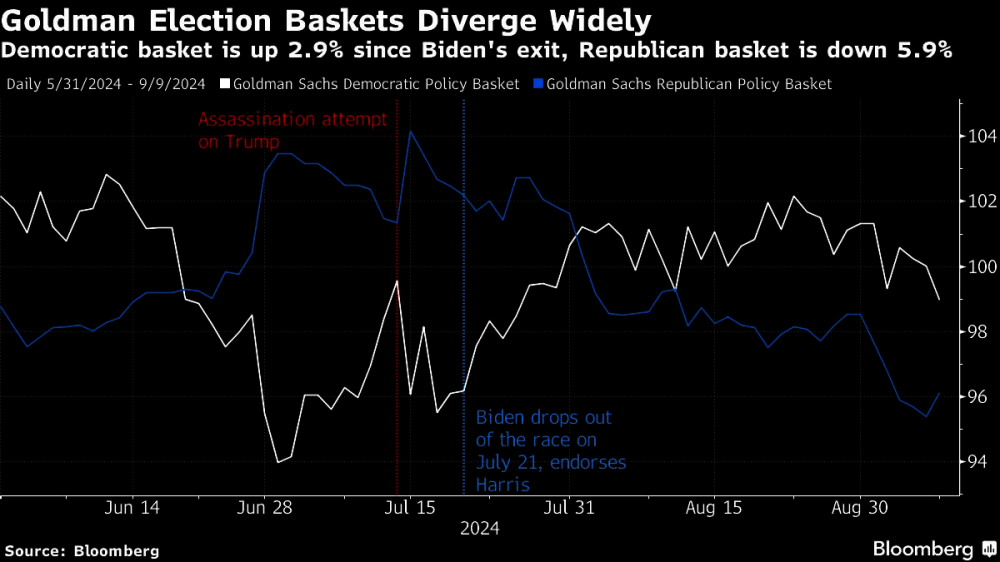In this Year of Many Elections, the big one — the US presidency — is just two months away. And the pivotal moment in the race yet, a presidential debate between Vice President Kamala Harris and former President and Republican nominee Donald Trump, is Tuesday, September 10.
For Wall Street, the faceoff may add another layer of volatility at a time when uncertainty around the labour market, interest rates and geopolitics is fraying investor nerves. The S&P 500 Index just clocked its worst week since March 2023 as another disappointing report on the US jobs data revived concerns that the economy is cooling, before rebounding on Monday.
From policy insights about taxes, trade, tariffs and immigration, here’s what investors will be following in the debate — and beyond.
Key issues for investors
Taxes: Trump has said he will lower the corporate tax rate to 15% from the current rate of 21%, vowed to make permanent the Republicans’ sweeping 2017 tax law and urged renewal of key portions of the bill. Meanwhile, Harris is pushing for an increase in the corporate tax rate to 28%. Her plan proposed keeping rates in place for those making less than $400,000, while raising taxes for higher earners.
Trade and tariffs: Trump has talked about a 10% across-the-board tariff, and steeper levies on Chinese-made goods. Even though Biden unveiled sweeping tariff hikes on a range of Chinese imports, including semiconductors, batteries, solar cells, critical minerals, steel, aluminium and electric vehicles earlier this year, Harris’ campaign messaging suggests that while she won’t go easy on China, she sees no upside in a greater rupture between the world’s two biggest economies. Goldman Sachs economists have said that, if Trump wins, tariffs on imports from China and autos will likely come quickly, raising the effective tariff rate by 3 to 4 percentage points and core PCE inflation by 30 to 40 basis points at the peak.
Immigration: Trump has said he will simply deport undocumented immigrants. Harris has shown support for an immigration deal that includes the construction of additional border wall; in the meantime, Democrats have shuttered the US-Mexico border to some asylum claims. JPMorgan Chase & Co strategists have said that any effective efforts to restrict immigration could be a potential driver of inflation if it creates significant labour shortfalls, thereby curbing growth.
Indexes from Goldman Sachs Group Inc that track trading strategies for each party show the Democratic one started outperforming the Republican one right around the time Joe Biden stepped down as candidate and endorsed Harris.
What data about election years show
Election years have generally been good for the US stock market. The S&P 500 Index has risen in almost every election year since 1960. The exceptions were 2000 and 2008, which were marred by the dotcom bust and the great financial crisis, respectively. The record looks even better for recent election cycles. In the three election years since 2008 — 2012, 2016, 2020 — the benchmark index rose at least 10%.
Taking a narrower view and focusing on just the last seven months of an election year gives a similar picture. Since 1950, the S&P 500 has risen in that time frame for 16 out of the 18 presidential elections, according to data and analysis from the Stock Trader’s Almanac. One down year was 2000, when the outcome was delayed for 36 days; the other was 2008.
That said, there’s such a thing as too much uncertainty
Despite Harris’ surge in recent polls, market pundits warn that the election may remain too close to call until the last minute — and there are chances, albeit small, that an outcome may not be clear until days after the election. Experts point to the possibility of a contested or close election result, as well as the ongoing adoption of vote by mail, where counting takes longer than machine votes.
During the 2000 Florida election recount battle, the S&P 500 lost more than 4%, yields on 10-year Treasury notes fell 52 basis points and gold prices jumped as investors piled into haven assets.
The possibility that the election may end in a protracted dispute or worse, political violence, is one that investors are grappling with as well. Markets are expected to struggle if such a situation arises, especially if it also means uncertainty for the final result.
What the ‘fear index’ is saying
Any major event that can affect the economy and disrupt markets can lead to trading volatility. Elections are no exception. The futures curve of the Chicago Board Options Exchange Volatility Index (VIX), also referred to as the Wall Street’s “fear index,” signals expectations for heightened volatility in stocks in the wake of Election Day on November 5.
Moreover, investors trying to gauge the sentiment toward equities around the election can now look directly at S&P 500 Index options linked to the period of the vote, in addition to the Cboe Volatility Index futures. S&P 500 options for November 6 shows traders are currently positioning for a higher probability of a sizeable move lower than contracts for the prior day.
Equities to watch if Harris wins
A Harris victory is expected to benefit a swath of industries such as renewable energy companies, electric-vehicle makers and even utilities. The bigger Harris trade, however, is the bet that she can avoid a trade war with China, in contrast to Trump’s more extreme rhetoric about trade and tariffs.
Democrats’ positive stance on clean energy means a Harris win would be good news for that entire group, including electric vehicle manufacturers such as Tesla Inc, Rivian Automotive Inc and Lucid Group Inc, EV charging network operators such as ChargePoint Holdings Inc, Beam Global, Blink Charging Co, as well as suppliers and battery makers.
Solar stocks — First Solar Inc, Sunrun Inc and Enphase Energy Inc among them — are expected to do better under Harris as well, given Democrats’ support for renewable energy.
Homebuilders could get a lift as well. Harris has proposed as much as $25,000 in down-payment support for first-time homebuyers, and suggested a tax incentive for builders who work on starter homes. She also called for the creation of a $40bn innovation fund to spur innovations in housing construction. Watch stocks like DR Horton Inc, Lennar Corp and KB Home.
The financial sector may not fare as well, given that a Harris administration is expected to stay tight on regulations, with higher capital requirements for banks such as Bank of America Corp, JPMorgan Chase & Co and Goldman Sachs Group Inc, and continued pressure on credit-card fee income. Drugmakers may also face regulatory pressure, as Harris has proposed a $2,000 annual cap on out-of-pocket costs for prescription drugs.
Equities to watch if Trump wins
Companies with high revenue exposure to China can face disruption if trade tensions escalate. Some prominent names include chipmakers such as Nvidia Corp, Broadcom Inc, Qualcomm Inc, materials companies such as Air Products and Chemicals Inc and Celanese Corp, autos such as Tesla Inc and BorgWarner Inc, and industrials like Otis Worldwide Corp.
Oil, natural gas and traditional energy companies are seen as likely beneficiaries of a Trump win, given his vow to roll back restrictions on domestic oil production. Stocks to watch include Baker Hughes Co, Exxon Mobil Corp, ConocoPhillips, Occidental Petroleum Corp and Williams Cos Inc Halliburton Co, Devon Energy Corp, Chevron Corp, among others.
The same clean energy and EV companies that have benefited from Biden’s Inflation Reduction Act are expected to face challenges under Trump, given that he’s said he will entirely reverse Biden’s EV policy. If Trump rolled back tax credits extended to buyers, companies at risk include Tesla, Rivian and Lucid, as well as battery makers and parts suppliers.
Defence stocks are expected to do better under a Republican win, given expectations that defence spending will be a clear priority for the party. Stocks to watch include Lockheed Martin Corp, Northrop Grumman Corp, and RTX Corp. Similarly, prison stocks like GEO Group Inc and CoreCivic Inc could gain, as tough immigration policies would benefit operators of correctional facilities. Gunmakers’ stocks, such as Smith & Wesson Brands Inc and Sturm Ruger & Co Inc, also tend to climb on Republican wins.
Cryptocurrency stocks have been seen as a proxy “Trump trade” of late, as the former president has made an about-face on Bitcoin and other digital assets since his time in office, even pledging to make America the “crypto capital” of the world. Stocks to watch include Coinbase Global Inc, Marathon Digital Holdings Inc, Riot Platforms Inc, Cleanspark Inc, MicroStrategy Inc and Cipher Mining Inc, as well as the Bitwise Crypto Industry Innovators ETF.
Shares of Trump Media & Technology Group Corp — the parent of Truth Social platform in which the former President owns a majority stake, and that of Rumble Inc — a video sharing platform in which JD Vance’s venture capital firm Narya owned shares as of May, may climb on higher likelihood of a Trump win.

Kamala Harris and Donald Trump.

